Flashback: Dr. King, John Lewis, Jimmy Hoffa attended the Detroit funeral for Viola Liuzzo
- Oops!Something went wrong.Please try again later.
Officials last month unveiled a monument in Viola Liuzzo Park in northwest Detroit to commemorate Liuzzo, the white civil rights activist who was slain after the 1965 Selma-to-Montgomery voting rights march. The monument also honors a Black Detroiter, Sarah Evans, who helped raise Liuzzo’s children after her death. The following coverage of Liuzzo’s funeral ran in the Free Press on March 31, 1965. It has been edited for length and content.
Civil rights leaders including the Rev. Martin Luther King Jr. and John Lewis and labor luminaries Walter Reuther and James Hoffa paused Tuesday to bury the latest in a long line of dead — a white heroine from Detroit.
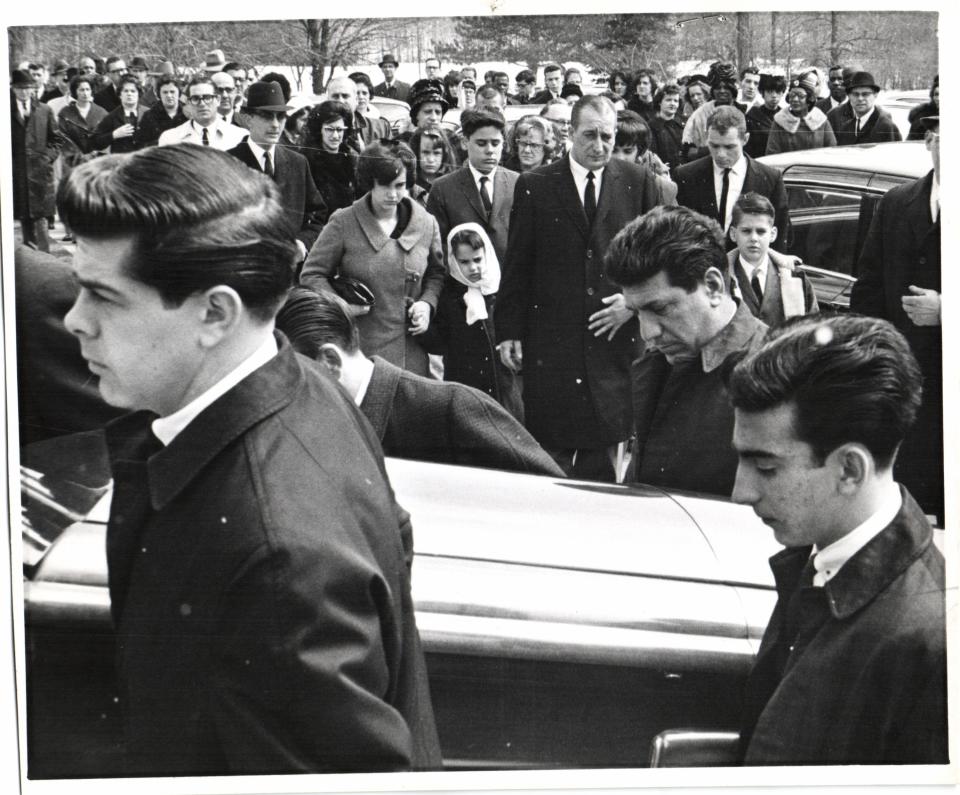
The leaders joined local dignitaries in a flat-roofed, brick church on Detroit’s northwest side and heard a Roman Catholic priest tell them: "We hurt. America hurts.”
The eulogy — and its charge to march until "love and truth" conquer "hate and deception" — was delivered for Mrs. Viola Gregg Liuzzo, 39, a mother of five.
Liuzzo was slain by a rifle bullet last Thursday night as she drove along an Alabama highway, ferrying marchers from Montgomery to Selma.
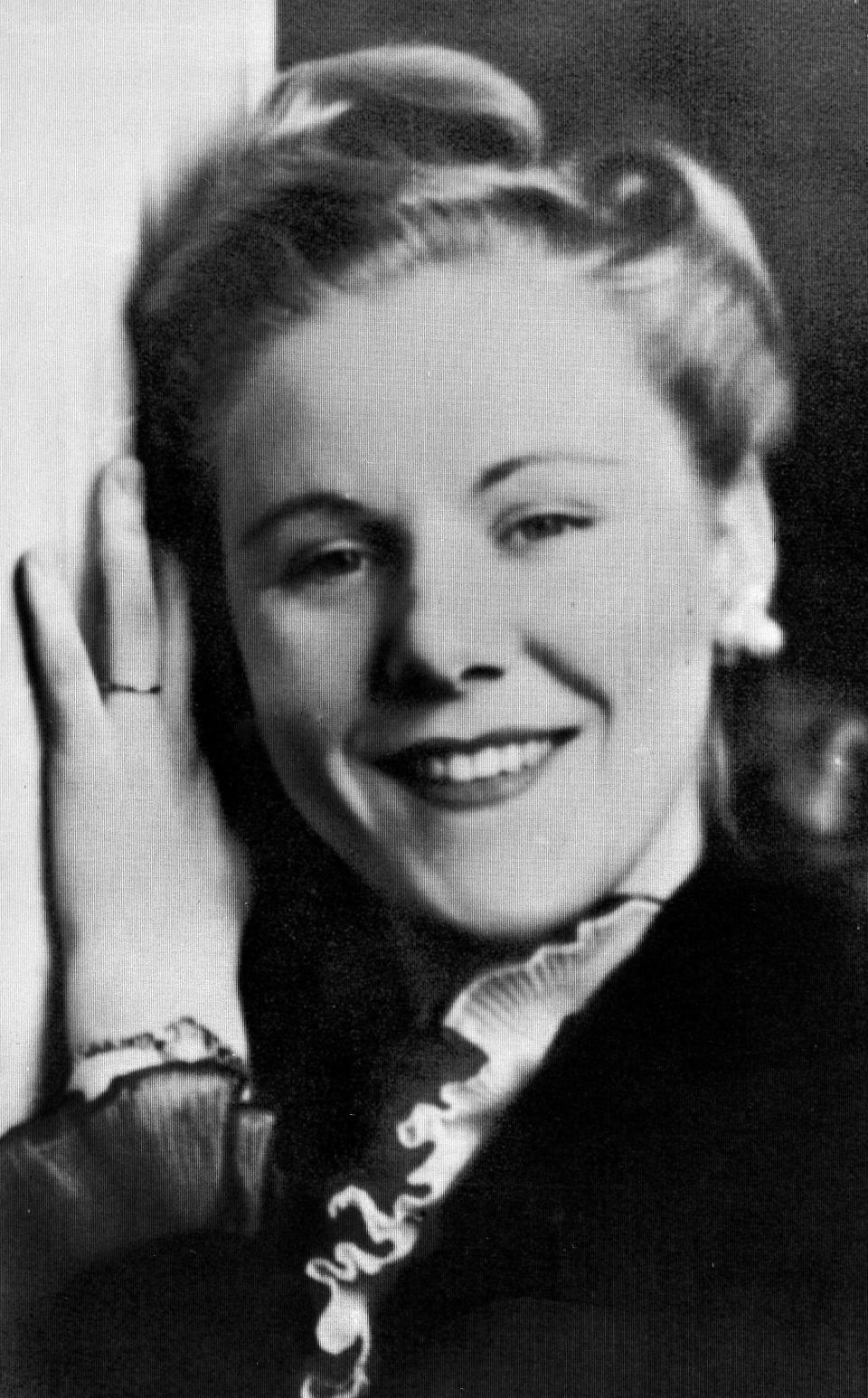
The Rev. James J. Sheehan, executive secretary of the Archbishop's Committee on Human Relations, eulogized Liuzzo at a solemn requiem mass in Immaculate Heart of Mary Church, at 16000 Pembroke.
Father Sheehan spoke with a controlled fierceness of a social climate that permits nightriders to kill from ambush and criticized the clergy for failing to lead the drive for equal rights.
"The voice of the white church has been a whisper," he said.
The ‘highway of hell’
Father Sheehan then asked a series of questions.
"How do you fathom the hurt of a man who has been in jail eight times because he tried to vote?
"How do you explain the hurt of a man who cannot freely select a home?
"How do you explain the hurt of a mother who is told by her little girl 'I'm nice and light,' almost as light as that little white girl.”
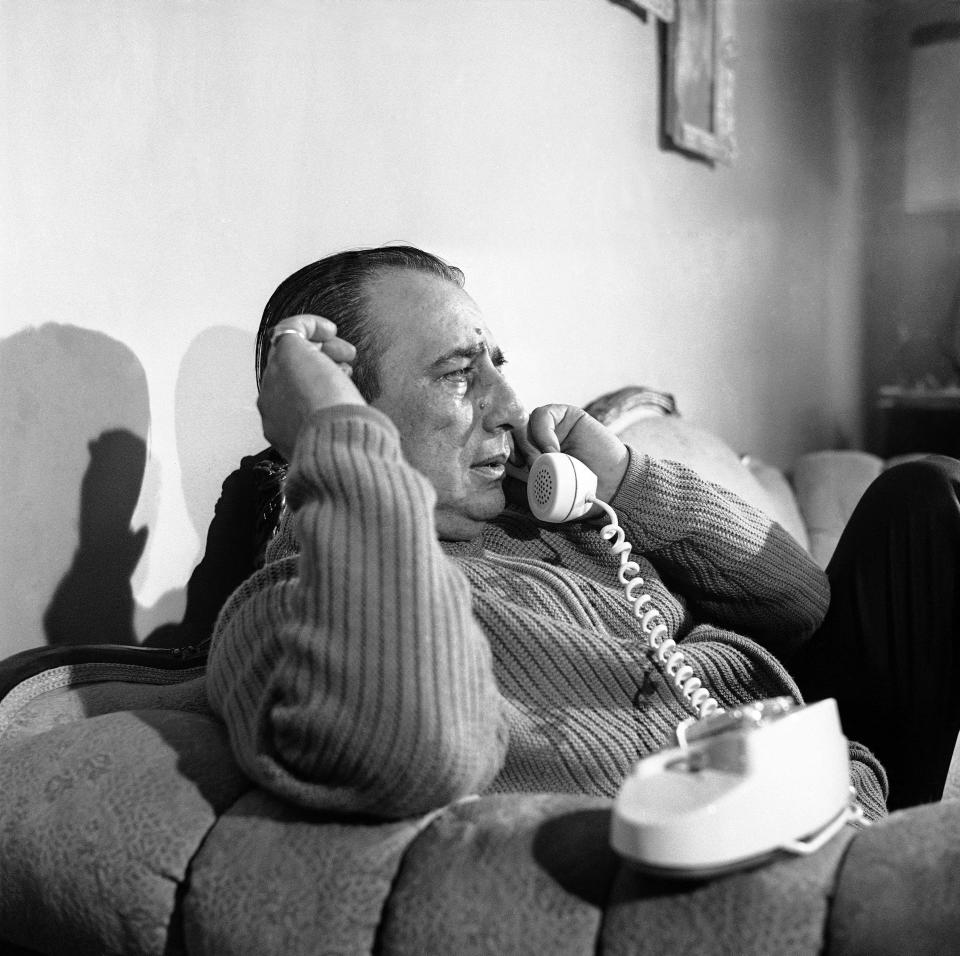
These things, he said, were "a deeper hurt than national embarrassment. Thousands marched. Hundreds went to jail. Viola Liuzzo died so that all of us would know there is this deeper hurt."
After he described Liuzzo's bravery on "the highway of hate, the highway of hell," Father Sheehan said: "Many people said, 'That woman should have been home taking care of her kids.'
“These people just don't know what they're talking about. Her death touched consciences so that we have to say she shouldn't have been there. We feel we must seek excuses for our own action."
As Father Sheehan spoke, some of the nation's top Black leaders bowed their heads in the pews. King, leader of the Southern Christian Leadership Conference and winner of the Nobel Peace Prize, stayed for all but a few minutes of the 80-minute mass. Then he caught a plane to Baltimore.
‘White persons of good will’
Before the service, Dr. King spoke of Liuzzo's death, saying "there are forces of evil alive in our nation that will use violence, terror, harassment — the darkest expressions of man's inhumanity to man to prevent progress."
Dr. King added: "I think her death revealed that there are persons of good will in our country — many white persons of good will — who are so committed to the cause of justice and human dignity that they are willing to pay the supreme price."
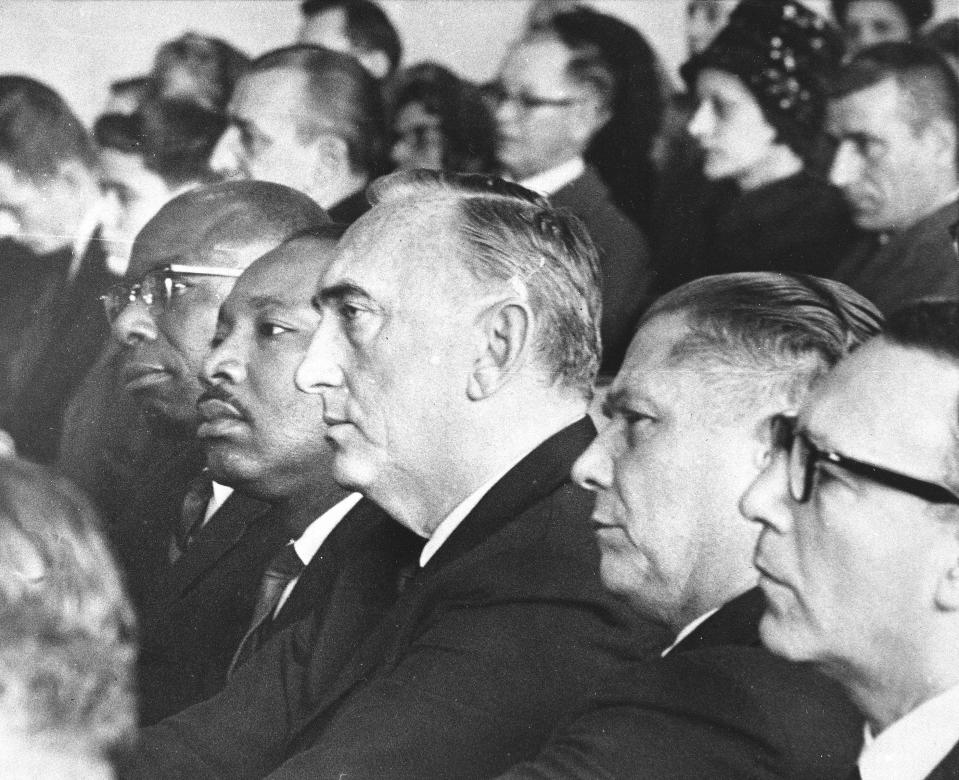
Roy Wilkins, executive director of the NAACP, attended the mass with the Rev. James E. Wadsworth Jr., president of the NAACP's Detroit branch. Wilkins said: "The fact that she might have had to sacrifice her life never entered her head. These kind of people are rare in the world.”
James L. Farmer, national director of the Congress of Racial Equality, attended the mass and the brief prayers at Holy Sepulchre Mausoleum with Lewis, national chairman of the Student Non-Violent Coordinating Committee.
Farmer said: “This tragic murder should help the nation mobilize toward that goal — equality for all."
A Black Teamster, James King, led pallbearers who ushered the mahogany hued casket that was draped with a black cloth with a white cross. It was placed in front of an altar on which were the words: "Give me thy heart."
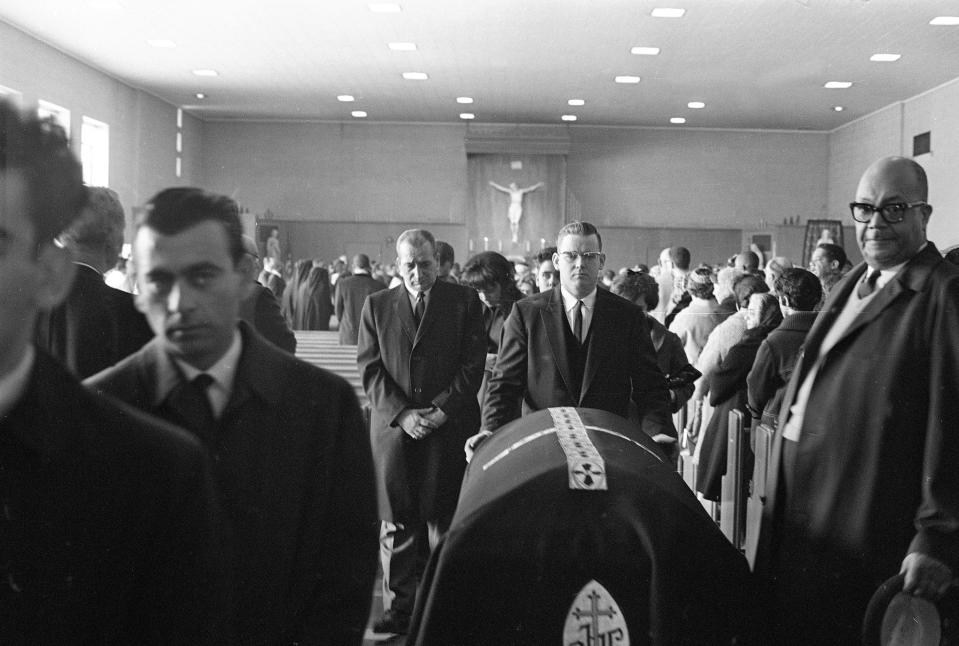
The Black and white dignitaries occupied pews to the left of the altar. Anthony Liuzzo, a member of the Teamsters, sat alone in the fourth pew on the right side of the altar. His children Penny, 18; Mary Johnson, 17; Thomas, 13; Anthony, Jr., 10, and Sally, 6; sat in the same pew, but a space or two away from Liuzzo, whose face was contorted with grief.
Behind Liuzzo were members of the immediate family and friends, and behind them were about 150 people who were permitted into the church.
‘She should have stayed home’
The mass ended with the singing of the civil rights workers hymn, "We Shall Overcome." Mourners filed out to the waiting hearse and cars for the trip to Holy Sepulchre Cemetery.
Outside the church, at Pembroke and Rutherford, a crowd gathered.
There was visible pain on many faces. On the face of Amelia Braziel, of 2419 Ferry Park, who stood in the cold “because my heart is aching.”
Pain was on the face of Sally Liuzzo, 6, who wore her red patent slippers on the day they buried her mother.
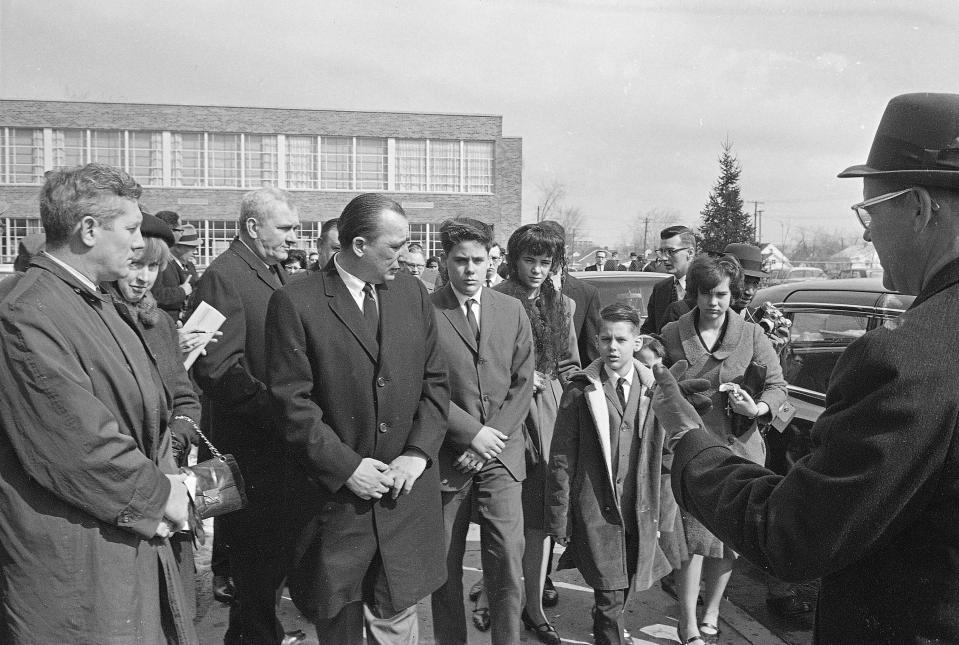
There was nonchalance, too. People who brought their cameras and children and punched each other and laughed when they recognized Reuther or King.
“I told my husband I’d never see so many celebrities again,” said one woman. “How can you miss a thing like this?”
Mrs. Maurice LaVere, of 19901 Prevost, brought four children under six. “This is history, let’s face it,” she said.
A Wayne County Sheriff 's Road Patrol car and two Detroit police cars led the 45-car procession to Holy Sepulchre’s mausoleum. It snowed on two bouquets of yellow rose sent by the Liuzzo children to their mother and placed on the steps.
Mrs. Carl Nihranz, of 15119 Birwood and Mrs. Donald Kuzawa, of Utica, stood across from the mausoleum.
“I wanted to see the mother,” Kuzawa said. “With five children, she should have stayed home.”
Speaking of Liuzzo, Nihranz said, “I don’t think she did any good. It’ll be a hindrance for the children. For a few days they’ll feel like martyrs, then they’re going to feel offended.”
Inside the circular chapel dominated by a triumphant Christ in stained glass, a family, a movement and a nation heard a quiet prayer of hope:
"I am the resurrection and the life; he who believes in me, even if he dies, shall live; and whoever lives and believes in Me, shall never die.”
Penny Liuzzo took the hand of her younger sister Sally and touched it to the casket.
Sally looked at her red shoes and tried hard not to cry.
This article originally appeared on Detroit Free Press: Dr. King, John Lewis attended funeral for Viola Liuzzo in 1965

